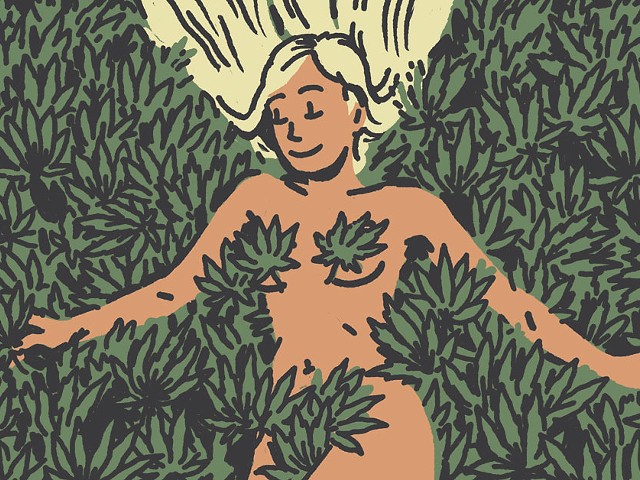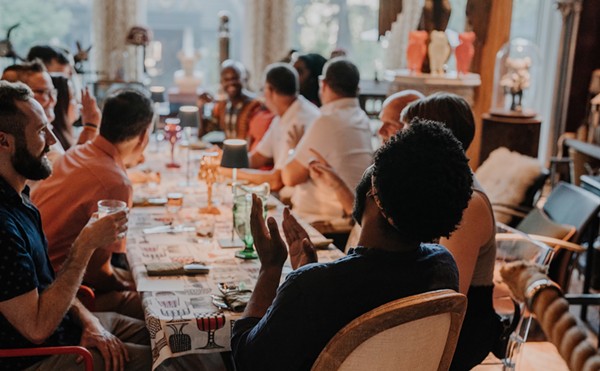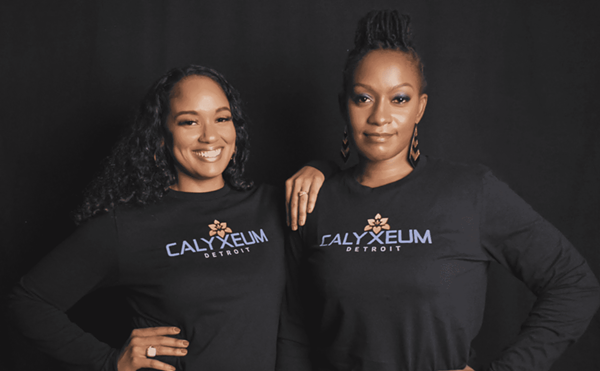It is possible to be a supporter of recreational marijuana use and oppose the petition initiative by Coalition to Regulate Marijuana Like Alcohol. And you don't have to look any further than the Abrogate Michigan petition.
AM is an initiative that seeks to amend the state constitution that by saying, essentially: "All prohibitions on the use of cannabis in any form by any person are hereby null and void." There's more there that you can find at abrogate.org, but that is the gist of it.
"It's a constitutional amendment," says Midland's Jim Locke, the man behind AM. "You have the right to use cannabis. ... If someone's got a joint there is no victim, there is not a crime."
That sounds pretty simple and positive from a marijuana user's perspective. But if you haven't heard about this before, it's because not a lot of people are talking about it. It's not that some people don't support the idea, it's just that few believe such a notion could get anywhere on a petition, or qualify for the ballot, or win if it did make it onto the ballot.
Locke admits that his petition will probably not make the ballot this year. Most pro-marijuana organizations in the state — MINORMAL, MiLegalize, Students for a Sensible Drug Policy, etc. — have thrown in with the CRMLA. Even though some of their members support positions that go further than the RMLA petition language, the general consensus is that this is the chance to make a big step for legalization and worry about the other stuff later. And all of the national organizations and their resources such as NORML and the Marijuana Policy Project are on board with CRMLA.
Locke, however, disagrees. "I'm kind of leery [about RMLA], sometimes a step off the cliff ain't that good," he says.
Locke leans toward the libertarian view of things on this issue, although the Libertarian Party is not affiliated with AM. He has that sense that the less government is involved in marijuana the better.
He says if you polled folks on what is your concept of legalization, "not many people think strict government control and heavy taxation."
And, he adds, "My focus is on getting the government out of people's minds."
Strict control and taxation is definitely what we're looking at with the medical marijuana regulatory system the state recently rolled out. I'd guess the majority of folks are happy that the state finally did something to move forward with the system after 10 years of opposition and stonewalling. Although there are a lot of people who took a chance and went into the business and got screwed over when the strict rules disqualified them. Locke looks at that as an example of how government will treat recreational cannabis.
"I know a lot of people that are very tentative, on the fence [about RMLA]," Locke says. "They believe any step is a good step, but not everybody believes that. I personally am very skeptical of it for many reasons. It's statutory legislation. Medical marijuana was that and we see how [lawmakers] have handled that."
Furthermore, Locke argues that all this talk about recreational marijuana pigeonholes the overall discussion about marijuana and government. He, correctly, points out that the potential for industrial hemp is huge for Michigan — hemp is literally a base for thousands of products from plastics to fuel to nutritional supplements and textiles.
I understand and sympathize with many of Locke's points. But I am not tentative about the RMLA. There is too much good that comes from taking this step. And something like RMLA is all that can be successful any time soon.
One major good is that it takes the incentive away from law enforcement to criminalize vast numbers of dark-skinned people. Studies show us that white people use marijuana at percentages roughly equal to blacks and Latinos. However blacks and Latinos are arrested for marijuana violations at much higher rates than whites. It's an excuse to oppress people, and there are already too many bullshit excuses out there to oppress people. Let's take this one off the table.
But I do agree with Locke that the metaphor of "regulate marijuana like alcohol" is incorrect. He says his goal is, "to make cannabis legal like vegetables," not like alcohol.
Well, it is a plant. Marijuana is not like alcohol but that's the metaphor most people relate to. It's going to take a really long time for people to disassociate the two. In the meantime, I'll accept the baby steps that we can take on this.
Munchies at work?— Did you ever get your order at a restaurant, or not get your order, and think the folks behind the facade just had to be high? Well, according to the results of a recent study done in Colorado, there is a 32.2 percent chance you were right. Food preparation and serving is the profession with the highest percentage of marijuana users in the study.
Is this why bosses are trying to get away with stealing servers' tips with a new law allowing them to take them? Do they believe you're too stoned to notice?
The upside of this could be that when you get the munchies you know exactly what to do about it.
But let us in the media not be the pot calling the kettle black. The No. 2 position in the study — at 27.5 percent — is held by those who work in "Arts, Design, Entertainment, Sports, and Media." Well, I have to admit to having had a few herb-inspired ideas that made it into a poem or song. And there are plenty of songs, paintings, and wiggy-looking pages that made me wonder.
Before you start pointing fingers at the creative folks and calling them derogatory names, check out your own area. The No. 3 position — at 20.8 percent — goes to "production," a broad occupational category that includes manufacturing, car machine shops, and administrative services. The top five are filled out with "Life, Physical, and Social Science" at No. 4, and "Sales and Related" at No. 5.
The entire list can be found here — and don't be too smug about the prospects in your office. Pretty much every profession could be included in some category on the list of 22 professions: "Legal" (15.9 percent) was No. 11; "Farming, Fishing, and Forestry" (16.5 percent) came in at No. 8.
Folks who are mad at teachers pretty much don't have this to throw at them. "Education, Training, and Library" (6.3 percent) showed up at No. 20. Finally, the least stoned folks (3.1 percent) showed up in "Health Care and Technical" at No. 22.
Maybe this gives a little more edge to the office game of guessing who's the pothead.






